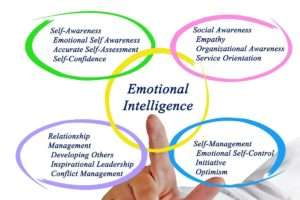Your ability to identify and manage your emotions and those of others can make a huge difference in your life.
Emotional intelligence is a term that has been around for a few decades now. But, it seems to have really taken the world by storm in recent years. Curious to know why? Well, it’s because more and more people are realizing how important it is to improve emotional intelligence.
Notably, research has shown that emotional intelligence has been increasingly beneficial for leaders and for helping them achieve their organizational goals (Srivastava, 2013).
Now, let’s dive into what emotional intelligence really is.
"Emotional intelligence is the “something” in each of us that is a bit intangible. It affects how we manage behavior, navigate social complexities, and make personal decisions that achieve positive results." - Travis Bradberry & Jean Greaves
- Your ability to identify and manage your emotions and those of others can make a huge difference in your life.
- What is emotional intelligence?
- Skills to improve emotional intelligence
- (1) Develop self-awareness to improve emotional intelligence
- (2) Improve self-management to improve emotional intelligence
- (3) Manage social awareness to improve emotional intelligence
- (4) Develop relationship management to improve emotional intelligence
- List of simple emotional intelligence solutions
- Final words on improving emotional intelligence
- How to control negative emotions?
- What are some tips for emotional self-care?
What is emotional intelligence?
A lot of different terms are being used to describe emotional intelligence including emotional quotient, EI, social competence, interpersonal intelligence, etc.
Emotional intelligence is the ability to identify and manage your own emotions, discern what causes them, as well as recognize and influence the emotions of others for more favorable outcomes.
As such, it’s a key factor for personal happiness, professional success and fulfilling relationships.
As such, it involves emotional awareness; knowing how we feel and why, as well as managing our feelings so that they don’t overwhelm us or affect our judgement.
Luckily, emotional intelligence can be improved through a range of activities that build on your natural strengths.
Read also: Emotional ideas for self-care to transform your life.

“It is a choice. No matter how frustrating or boring or constraining or painful or oppressive our experience, we can always choose how we respond.” - Edith Eger
Skills to improve emotional intelligence
Emotional intelligence is made up of four key skills: self-awareness, self-management, social awareness and relationship management.
Actually, each skill has two components: the first is internal; how you handle yourself and your emotions. The second is external; how you handle others and work with them.
Read also: 23 Simple tips to control negative emotions
Here are a few strategies you can use to get started:
(1) Develop self-awareness to improve emotional intelligence
Self-Awareness is your ability to recognize your own emotions and stay aware of them as they happen.
As such, self-awareness includes the strengths of prudence, conscientiousness, self-confidence and self-reliance.
It also means having an accurate read on how others perceive you.
Benefits of improving self-awareness
Self-awareness is critical for improving emotional intelligence because:
- Self-awareness helps you manage your emotions more effectively.
- You avoid overreacting or under reacting to situations that involve strong emotions.
- People see you as self-assured and poised, rather than defensive and reactive.
Fortunately, self awareness allows you to objectively understand what drives you, as opposed to what you think should drive you.
It’s the difference between saying, “I want that job because it would be a really good fit for me” and “I want that job because I need the money.”
(2) Improve self-management to improve emotional intelligence
Secondly, to enhance your emotional intelligence, self-management is necessary.
Self-management refers to your ability to manage your own emotions in a way that produces positive results. Subsequently, it includes the strengths of self-control, trustworthiness, fairness, optimism and initiative.
Benefits of improving self-management
Self-management is important for improving emotional intelligence because:
- You’re less likely to engage in destructive behaviors that hurt you or other people.
- Self-management makes you appear as a calm, cool and collected person who can be counted on to follow through.
- You build deeper connections with other people because they see you as someone they can count on.
Additionally, emotional self-management is key because it gives you the ability to control impulsive or knee-jerk reactions, so you can make more objective decisions.
Self-management also helps you understand what’s really behind your own actions and behaviors.
For example, if someone tells you they’re angry with you, but your read on their body language is that they’re actually sad, self-management helps you understand which emotion they are really experiencing.
Read also: 10 Reasons why controlling emotions and staying calm is important

"Today companies worldwide routinely look through the lens of EI in hiring, promoting, and developing their employees."- Daniel Goleman
(3) Manage social awareness to improve emotional intelligence
Social Awareness is your ability to accurately pick up on other people’s emotions and stay attuned to what others are thinking and feeling, even in the face of conflict. Notably, social awareness includes the strengths of empathy, service orientation, organizational agility, credibility and political awareness.
As such, being socially aware means you can pick up quickly on facial expressions, tone of voice and body language to get a sense of how others are feeling based on verbal and/or non verbal cues.
Benefits of improving social awareness
The benefits of enhancing social awareness include:
- You have a clear view of how others are reacting, so you see potential problems before they happen.
- Being socially aware helps you avoid simple misunderstandings and common mistakes that can damage relationships and derail deals.
- People perceive you to be a good leader who keeps team morale high by weighing everyone’s opinions equally.
In fact, empathy is an important trait of social awareness because it allows you to get inside the heads of other people so you can understand why they do what they do.
For example, if someone misses a deadline on a project after being asked repeatedly to deliver it by a certain date, empathy helps you realize that not following through had more to do with them being disorganized than it has to do with disrespecting you.
Social awareness also helps you understand what is really driving other people, which gives you the ability to work through problems together instead of holding grudges.
For example, if it turns out that someone was late delivering a project because they felt like they didn’t have enough time to do it well, then you can help them brainstorm ideas for how to improve their timeliness in the future.

(4) Develop relationship management to improve emotional intelligence
Relationship Management is your ability to build and maintain positive relationships with other people.
Actually, it helps you manage interactions with others in a way that produces positive results for you and them.
It includes emotional intelligence strengths of:
- Influence: Your ability to inspire and motivate people by generating enthusiasm for an idea or cause.
- Teamwork: Your ability to facilitate cooperation and teamwork in a group.
- Conflict resolution: Being able to resolve interpersonal conflict, disagreements and misunderstandings. This may be one of the most influential of all social awareness skills.
- Persuasion: Having the capacity to convince others to change their minds or take action by making a strong case with supporting reasoning.
- Customer service orientation: Your ability to assist and support others with a positive, helpful attitude.
- Connection with others: Relationship management is more than just communication. In fact, it is about keeping relationships healthy, both at work and in your personal life. When you’re good at relationship management, people see you as a good leader who who works well with others and brings out the best in them.
Actually, it helps you manage interactions with others in a way that produces positive results for you and them.
Benefits of improving relationship management
The benefits of relationship management for improving emotional intelligence include:
- Personal life success including in marriage and friendships.
- Enhancing work environment (positive work experience, strong working relationships, productive team morale)
In fact, one way to think about relationship management is that it’s your ability to be emotionally intelligent within relationships at home, work or school.
you’re more likely to feel motivated at work if you enjoy working with your colleagues, and that drives relationship management strengths like teamwork and cooperation.
Collaborating means listening to other people’s ideas and incorporating them into your own work.
You want to make sure that others feel heard and understand their input is valued.

“Between stimulus and response, there is a space. In that space lies our freedom and power to choose our response. In our response lies our growth and freedom.” – Viktor E. Frankl
List of simple emotional intelligence solutions
Here’re some simple tips to improve your emotional intelligence:
1. Practice mindfulness
Mindfulness is the practice of training your mind to focus on what you’re experiencing in the present moment, without any judgment or criticism.
In fact, his includes emotions as well as physical sensations.
2. Be aware of your nonverbal signals
Your body language, tone of voice and facial expressions all send messages to other people about how you are feeling.
The more aware you are of these signals, the better able you will be to regulate them and express yourself in appropriate ways.
3. Watch for emotions in others
The best communicators are the ones who can not only read emotions in themselves, but also emotions in others.
4. Engage with your feelings
Negative emotions such as anger or sadness are often the most overwhelming, leaving us feeling out of control and powerless
5. Find someone you trust
Sharing difficult thoughts and feelings with another person can help you feel less alone and misunderstood.
In fact, people who have strong social networks and friends are better able to recover from stress and anxiety.
6. Don’t get caught up in thinking you’re right all the time
Emotionally intelligent people are open to new information. They are confident but not overly so. Also, they know what they know and also realize what they don’t know.
7. Take care of your mind and body
Maintaining a positive outlook on life can be achieved through healthy habits such as getting enough sleep, spending time with others and being physically active.
8. Manage your emotions
Practice your problem-solving skills to create a plan for dealing with overwhelming events, such as a death in the family or an unexpected bill.
9. Take control of your life
Feeling overwhelmed or depressed can make you feel like there’s nothing you can do to change your situation.
But you have more power than you realize to reduce stress and increase happiness
10. Develop self-awareness
The first step toward changing any behavior is becoming aware of it. If you are not sure how you appear to others, ask people who know you well for their perspective on your strengths and areas in need of improvement.
11. Don’t get caught up in thinking you’re right all the time
Emotionally intelligent people are open to new information. They are confident but not overly so.
Additionally, they know what they know and also realize what they don’t know.
12. Don’t take yourself too seriously
Humor plays a big role in emotionally intelligent interactions. Notably, this can include using sarcasm, being able to laugh at yourself or being able to laugh at the absurdity of life.
It’s all about being able to see things from a different perspective – which is part of emotional intelligence.
13. Listen with empathy, not sympathy
If you want the other person to feel heard, you should make eye contact and acknowledge their emotions without judging or changing the subject.
14. Don’t be afraid of silence
When you pause, you give your mind time to come up with the right words so they are not defensive or dismissive. Remember, silence also speaks volumes. Know when to use it.
15. Strive for authenticity
Fake it and you’ll come off as untrustworthy and disingenuous. Be as authentic as possible. If you’re shy, admit it. If you’re nervous, let them know that too.
In fact, the more open and honest you are from the start, the better your relationships will be in the long run
16. Let go of what you can’t control
Worrying won’t make things any better. Actually, if you are letting yourself get worked up, that takes away from your emotional intelligence.
17. Do altruistic acts
Helping other people makes us feel better about ourselves, which in turn boosts our emotional intelligence.
18. Focus on solutions, not problems
Emotionally intelligent people are able to solve problems instead of focusing their energy on wishing things were different or complaining about them.
They also don’t complain about the problem – they focus on the solution.
19. Get comfortable with being uncomfortable
Finally, just because you feel anxious about something doesn’t mean it’s going to be a disaster.
Emotionally intelligent people are able to rise above their initial reaction and take action anyway.

“We don’t know where we’re going, we don’t know what’s going to happen, but no one can take away from you what you put in your own mind.” – Edith Eger
Final words on improving emotional intelligence
The key to improving your emotional intelligence lies within you. Fortunately, you have control over how you respond and react in any given situation. But, it does take work.
It takes time and dedication to learn what triggers certain responses from us so we can avoid them or better manage them when they come up.
With practice, patience, understanding, and empathy–you too can become a more emotionally intelligent person.
"A view of human nature that ignores the power of emotions is sadly shortsighted."-Daniel Goleman
If you’ve found these tips helpful please share your thoughts below.
Related topics
How to control negative emotions?
Negative emotions can be debilitating and destructive. In fact, they can cause us to act impulsively, make bad decisions, and say things we later regret.
In this blog post, I explore some ways to control negative emotions and keep them from overtaking your lives. Read more
What are some tips for emotional self-care?
Self-care is important for your mental and emotional health.
But, it can be difficult to know where to start. Here are some of the best tips for emotional self-care. Read more about emotional ideas for self-care
References
Srivastava K. Emotional intelligence and organizational effectiveness. Ind Psychiatry J. 2013 Jul;22(2):97-9.
Rushana Greenidge-Horace










Leave a Reply